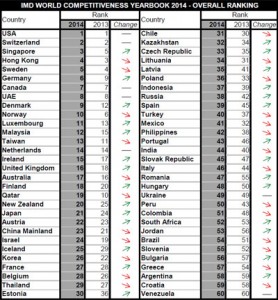“The overall competitiveness story for 2014 is one of continued success in the US, partial recovery in Europe, and struggles for some large emerging markets,” said Professor Arturo Bris, Director of the IMD World Competitiveness Center. “There is no single recipe for a country to climb the competitiveness rankings, and much depends on the local context.”
Highlights of the 2014 ranking
 The US retains the No. 1 spot in 2014, reflecting the resilience of its economy, better employment numbers, and its dominance in technology and infrastructure.
The US retains the No. 1 spot in 2014, reflecting the resilience of its economy, better employment numbers, and its dominance in technology and infrastructure.
There are no big changes among the top ten. Small economies such as Switzerland (2), Singapore (3) and Hong Kong (4) continue to prosper thanks to exports, business efficiency and innovation.
Europe fares better than last year, thanks to its gradual economic recovery. Denmark (9) enters the top ten, joining Switzerland, Sweden (5), Germany (6) and Norway (10). Among Europe’s peripheral economies, Ireland (15), Spain (39) and Portugal (43) all rise, while Italy (46) and Greece (57) fall.
Japan (21) continues to climb in the rankings, helped by a weaker currency that has improved its competitiveness abroad. Elsewhere in Asia, both Malaysia (12) and Indonesia (37) make gains, while Thailand (29) falls amid political uncertainty.
Most big emerging markets slide in the rankings as economic growth and foreign investment slow down and infrastructure remains inadequate. China (23) falls, partly owing to concerns about its business environment, while India (44) and Brazil (54) suffer from inefficient labor markets and ineffective business management. Turkey (40), Mexico (41), the Philippines (42) and Peru (50) also fall.
About: IMD, a top-ranked global business school based in Switzerland, produces annual world competitiveness ranking. As part of its ranking of 60 economies for 2014, the IMD World Competitiveness Center also looks at perceptions of each country as a place to do business.
Source: IMD Competitiveness Center





















